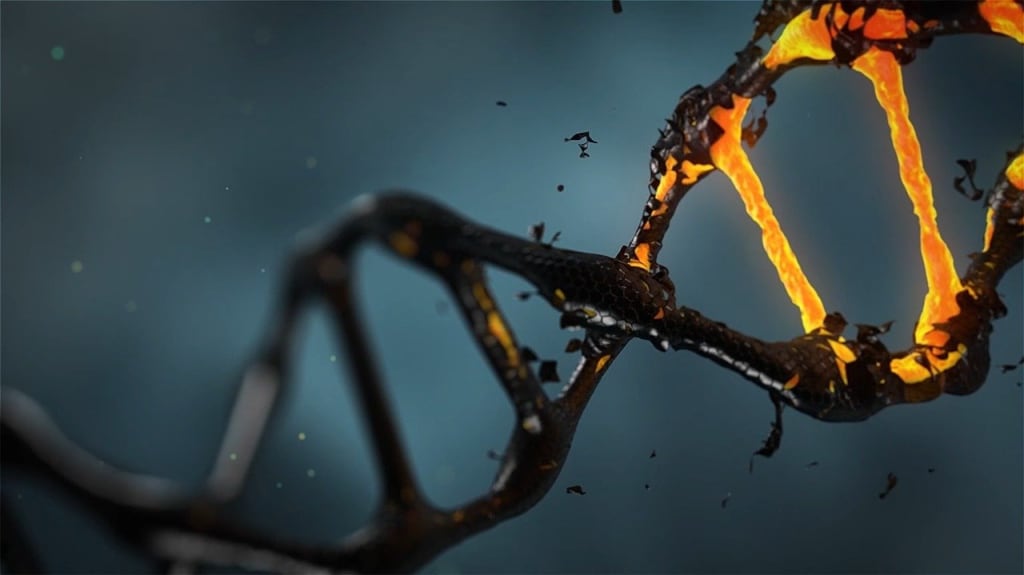The Strand
Do the needs of the many always outweigh the needs of the few?

“They’ll likely unwind me next.” His voice carried no fear or resignation. He spoke as if he were ordering at a pub, and had nicknames like a frequent customer, too. Ol’ Corin and Deathless Corin were the most prominent. A slumbering baby lay in his arms. Not very old, judging from her rosy skin. Corin allowed himself to kiss her forehead. Pure, peaceful, and perfect. Things he wasn’t. Not anymore.
Beside him, his granddaughter sat in bed. The frame saw better times but was stout, composed of hardy stuff called cherry wood. Mehri never ate cherries before; grandpa Corin insisted they—and other fruits—flourished before the First Wave. Noxious things grew from the earth now, emitting a ghostly blue, able to transform atoms and poison gene ladders. Strands. Helixes. The proper scientific term in his time.
A Strand was a treasure trove of knowledge if extracted correctly. Hereditary weaknesses, strengths, potentials, and even genetic memories, which were paramount to advance a race now steeped in radiation. He recalled when cancer was a death sentence in his youth. Not so now. Technological progress ushered in an era of equal hope and despair. ‘Science can kill or save,’ he always told her. ‘It’s like a sword: it depends on its wielder.’
Her sleepy eyes and worry lines marred her youth. “What?” Despite recuperating from the rough birth, she remained fiery. She heard but didn’t understand. He couldn’t be unmade yet. How could he be so insensitive with his great-granddaughter in his arms? The babe slept, unconcerned with their exchange. Good. “How can you talk like that?”
“Mehri—”
“No. I’ll hear none of it.” Her tongue was a knife, sharp and cutting him off with no remorse. Hours of labor served as a whetstone. Men sowed wombs, but never experienced the pain of bearing the fruit.
“Can’t you wait?” No answer. It wasn’t his decision to make. Instead, Corin’s rocking chair kept creaking, still withstanding heavy years of pondering and choices. His eyes wandered from the infant to her mother, irises transitioning from warmth to cool iron. Ghosts haunted the windows of his soul.
Despite being over a century old, his looks belied his age. He possessed little grey hair and lacked fragility. He lived during Oppenheimer’s time, then witnessed the push for nuclear disarmament from The Council (then known as the United Nations). He also saw when the system failed and human selfishness suffocated the earth with a radioactive blanket. They said the First Wave smiled on him: his telomeres mutated, expanded, giving him longevity. Regarded as a miracle, nobody spoke about how long years brought long misery such as burying one’s children — and sometimes grandchildren — in a perverse cycle of life.
“It’s custom now.” Corin ignored her dismissal. “New life emerges, they unwind an Elder. The Council takes their Strand for research, then adds it to the collective. The old must make space for the new.” It was a poetic way to rephrase population control. Resources lessened after the First Wave’s fallout, leading to competition. Decades later, much of the planet still festered with toxicity. Radiation abounded, but exposure varied. They locked most ground zero survivors inside their cities. Emissions razed their homes and genes. It rendered some barren, while others birthed mutants — Muties or Mutes for short. Mutated traits were chaotic, a genetic lottery; gifts included longevity, heightened senses, or even polydactyly. Those qualities improved survival compared to parasitic twins or full paralysis. The greater the detriment, the likelier to perish.
Mehri narrowed her eyes. They were obsidian sharp, equaling her grandfather’s steely gaze. “I know,” she snapped, “but I don’t understand.” Tears came, hot, matching the agony burning in her heart. The body could heal, but the soul’s wounds lasted forever. Pain did not shrink. Like a tree, one only grew around it or withered.
Her head slumped back against the headboard. A sob wracked her. “Not you. Not now. Please.” All she had were him and her tiny Bijou. Jewel. An intentional name since her daughter was the gem of her life. “We need you.” She wished the others survived. Her husband, parents, siblings… Gone. Memories drowned her, a tsunami borne from the quake within her chest.
They had arrived too late. The blast blackened their house on the surface, save for a few patches of color—silhouettes. Like a still from a shadow puppet theater, the family suspended in playing, in living, oblivious. Their only remains were these flat vestiges, fixed in the liminal space between existence and nuclear vaporization. There were two blessings: they knew nothing and felt nothing — those were for the survivors.
Corin knew that thousand-yard-stare from experience. While she could visit the past, she shouldn’t be trapped there. He wielded his voice like a shepherd, using it as a metaphysical crook to guide his granddaughter back. “Be here. Now.” His timbre was low and firm, pulling the flashback away like a drape. Mehri jolted, then fingered her silver locket. Heart-shaped, engraved, and old-world, passed from mother to daughter for generations. Corin remembered it: his wife Irina placing it in Leda’s palm, then Leda fastening it around Mehri’s neck years later. He remembered the little feminine ritual his wife, daughter, and granddaughter shared. Then he remembered Irina and Leda were dead. His heart cracked more, but Bijou gurgled, yanking him from despair’s maw. She and Mehri were the family’s last. He knew tradition did not always equate to truth. He knew his presence ensured their survival. Guilt dropped into his belly like a boulder.
Before he slept that night, her pleas still raked his mind with tenacious claws.
Can’t you wait?
Please.
We need you.
Today had all the questions. Tomorrow had answers.
About the Creator
Jessica N. W.
A slave to the humanities: art, music, literature, film, philosophy, psychology, etc. I make things. I have one child: a hedgehog named Zander. He likes to sleep. I don't blame him.






Comments
There are no comments for this story
Be the first to respond and start the conversation.